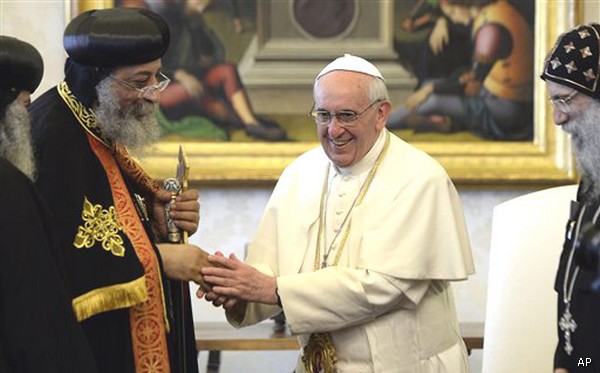
By Cian Molloy - 20 March, 2017

A tale of two popes! Pope Tawadros II, head of the Coptic Orthodox Church in Egypt, met with Pope Francis in Rome in 2015, the first time the heads of both churches met in 40 years. (AP Photo/Andreas Solaro, pool)
The Pope is to visit Egypt at the end of next month, the second ever papal visit to the Arab Republic.
Commentators say that the two-day visit to Cairo on Friday and Saturday 28 and 29 April is an indication of the growing warmth in relations between the Catholic Church and the Muslim world.
The Vatican Press Office Director Greg Burke said the visit was in response to a joint invitation from the President of the Republic Abdel Fattah el-Sisi, the bishops of the Catholic Church in Egypt, the head of the Coptic Church His Holiness Pope Tawadros II, and Sheikh Ahmed Mohamed el-Tayeb, the Grand Imam of the Mosque of Al Azhar.
Details of the itinerary for the visit are to be released shortly, but Egyptian presidential spokesman Alaa Yousef says meetings with President el-Sisi, Sheikh el-Tayeb and Pope Tawadros will all be part of the trip.
Relations between Rome and Muslim authorities in Egypt have been strained following the bombing of a Coptic church in Alexandria on New Year’s Day 2011, after which Pope Benedict called for greater protection of Christians in Egypt. However, last May, Sheikh el-Tayeb, the most senior Muslim cleric in Egypt, visited the Vatican and was warmly embraced by Pope Francis in a meeting that signalled a greater openness in communication between the two monotheistic faiths.
The Coptic Orthodox Church of Alexandria, said to have been founded by St Mark the Apostle, is the largest Christian denomination in Egypt. Simply put, the word ‘Coptic’ means Egyptian, and 95 per cent of Coptic Christians belong to the Coptic Orthodox Church, which has not been in communion with Rome since the Council of Chalcedon in 451. The two churches split over a disagreement about the divine and human nature of Christ. Separately, there is a minority Coptic Catholic Church which is in communion with Rome. In total, Christians – Catholic, Orthodox and others – make up about 15 per cent of Egypt’s population.
There has only been one other papal visit to Egypt, when Pope John Paul II visited the country in 2000. Since then, much has happened in the country. President Mubarak was deposed from power in the Arab Spring of 2011, which saw Egypt’s first democratic elections leading to the appointment of President Mohammed Morsi. His tenure was a short one, however, as he was deposed in a military coup that saw President el-Sisi take power.